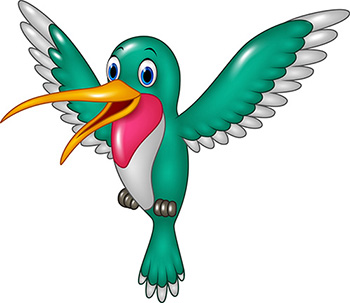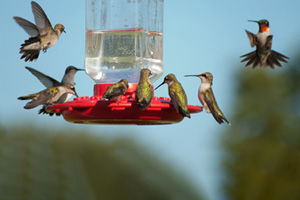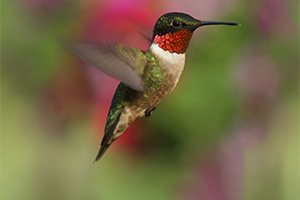Why Do Hummingbirds Hum?

By Bill Willis and Ron Cannon
October 25, 2018
- The smallest bird is the Bee Hummingbird
- The Hummingbird’s diet includes nectar, sap, insects, spiders, and sugar water (human supplied)
- Hummingbirds sleep perched or enter a state of torpidity
People seem to have a warm spot in their hearts when it comes to hummingbirds. Even veteran bird watchers get excited upon seeing a new visitor. Hummingbirds get their name from the humming sound produced by their wings beating at 70 beats/sec when flying, and they also chirp.
Hummingbird feeders with fresh sugar water help attract Hummingbirds to your yard. The birds seem to instinctively remember where your red feeders are and will revisit that location when thirsty, so keep them clean and available. A Hummingbird’s primary diet consists of nectar, pollen, sap, and insects so take time to plan(t) a well-rounded buffet.
Male Hummingbirds are territorial and protective of nesting sites and feeders, often chasing other birds away. However, they will accept a familiar human. The presence of only two males may set off aggression whereas a flock would not. The sugary drinks help to sustain these fabulous creatures as they prepare for migration.


The Ruby-Throated Hummingbird (Archilochus colubris) spends the summers in eastern North America and Canada where it breeds once or twice. Chances are this bird will visit your yard in search of food. After mating, the female builds a 1.5-inch nest to house the two jellybean-sized eggs. During this time, the male searches for another female. After eighteen days, eggs hatch and the young will fledge after another twenty-one days. In North Carolina all young birds leave the nest by mid- August and begin migration in October.
These migratory birds return to Southern Mexico and Central America for the winter. Migrations are hazardous for the Hummingbirds, especially the first trip because of the many natural and man-made obstacles they face on their journey. Extreme weather, ecosystem modification/destruction, high-rise physical obstacles, and predation require careful management along the way. Therefore, their life expectancy is limited to three to five years under favorable circumstances.
Why do hummingbirds hum? They don’t know the words.
REMEMBER: Hummingbirds are credited with never forgetting the flowers that they’ve visited and when nectar is available. This is important since they must feed regularly and frequently.
You can help these birds by providing them with the enhanced and pesticide-free environment that they need for their survival.



